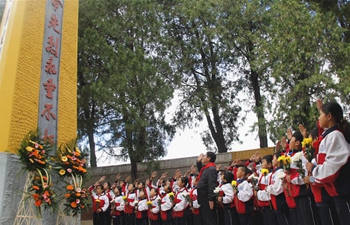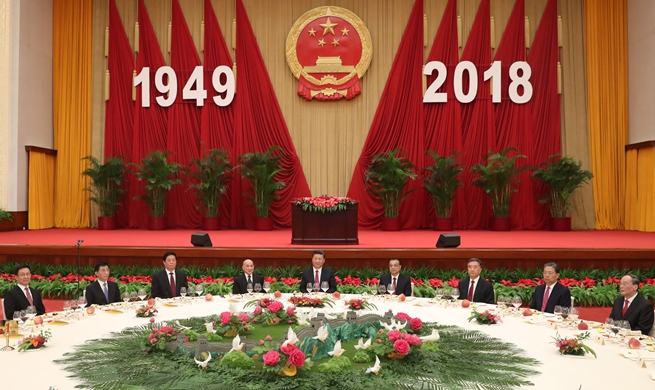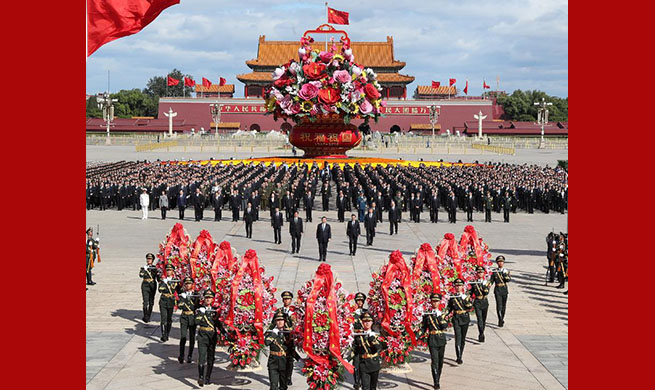by Xinhua writers Yu Xiaohua, Sun Mei, Hu Jing
SAN FRANCISCO, Sept. 30 (Xinhua) -- "Good evening, everyone. It's a great pleasure for me to join you here to enjoy this traditional Chinese cultural feast," Charlie Hoffs, a Stanford University freshman, said fluently in Chinese when speaking at a Confucius Institute Day celebration here this weekend.
More than 600 people from the San Francisco state and local schools, as well as Confucius classrooms and teaching sites across northern California, enjoyed the event's fantastic Chinese cultural performances, which included the dance "Flying Dragon, Leaping Tiger," a group performance of "A Moonlit Night on the Spring River," and the duet "The Moon is High in the Sky."
Earning rounds of applause, the performance, held at the McKenna Theater, San Francisco State University as part of the celebrations of the annual Global Confucius Institute Day, was co-hosted by Hoffs and Kaylee Doty, a senior student at the Confucius Classroom of the Western Sierra Collegiate Academy in Sacramento, the capital of California state.
The two young American women defeated 106 teams from 96 different countries, becoming the international victors in the 2017 Chinese Bridge International Language Competition. In an interview with Xinhua, the pair said their passion for and their perseverance with Chinese language learning helped them stand out.
A VITAL LANGUAGE
Hoffs, who chose Jiang Mingxi as her Chinese name, said she was fascinated by the Chinese language eight years ago. She said, "I found a Mandarin book when I was ten. The characters in the book seemed to be flowers side by side. Since I love drawing flowers, I began to draw those characters. That started all of my romance with Chinese."
"Then I increasingly realized the language's importance in economy and tourism," she said.
"China has one-seventh of the world's population," she said, adding it is important to communicate with the Chinese people on an intimate level.
"China is also increasingly a rising power and is capable of navigating the business world. So, Chinese is a vital skill."
Hoffs's remarks resonated with a couple of parents and teachers coming to watch the performance. Ms. Zhang, a mother of an eight-year-old girl, told Xinhua that she drove three hours here from Chico, northern California so that her daughter could enjoy genuine Chinese culture.
Zhang, who came to the United States 20 years ago, said bilingual learning can help children in terms of brain development.
What's more important, said Zhang, who only gave her last name, learning Chinese has helped her daughter connect to her extended family back in China.
"We go back to China every year. My daughter blends right in. It is very important to her future," Zhang said.
David P. Wong, assistant superintendent of the San Francisco Unified School District, also said Chinese learning was a gift given by Chinese-American parents to their children, with which they could learn more about the Chinese culture.
"With language programs and cultural programs working in conjunction with the Confucius Institute, they can have a better understanding of their roots. That builds a very strong relationship," he said.
Doty and Hoffs's Chinese teacher, Gao Chen Qiumin, told Xinhua, "We have more and more students coming from white families and there is still a long candidate list waiting to be enrolled into our school."
"I have taught Mandarin for over 20 years and witnessed the students growing from 50 to more than 300 in my district," she added.
A COOL, UNIQUE SKILL
Chinese language learning is growing popular in the United States, Doty said, adding that she was surprised when she found while participating in the Chinese Bridge competition that many people her age are learning Chinese and a lot of them speak more fluently than she does.
"Although it is difficult with some of the grammar structures because it is very different from the English part, it is really worth it and you can use it a lot in the world," said Doty, whose Chinese name is Huang Qiuyue.
Hoffs shared her opinion. "Many people have recognized that we should have got on the train earlier ... It is still a rather unique skill."
"I believe that in a time when skills are scarce ... the people who do possess that unique perspective and unique connection with China will be more highly valued," she said, adding that studying Chinese also gave her an edge in her university admission.
She said her main essay to Stanford was about how she chose her Chinese name and what that name meant to her.
"Choosing that name helps me better understand myself. I choose Jiang because when I traveled to Lijiang, I just fell in love with it. I choose Mingxi as I want to express my desire with greater clarity and to live a clearer and more mindful life," she said.
According to statistics from the non-profit U.S.-China Strong Foundation, about 400,000 students in the United States are currently learning Chinese, twice the number in 2015.
"People in the Bay Area (of San Francisco) see the value in learning a second language. Chinese being the most spoken language in the world, they can foresee that by learning this language actually opens doors for them in their future career," Wong said.

















